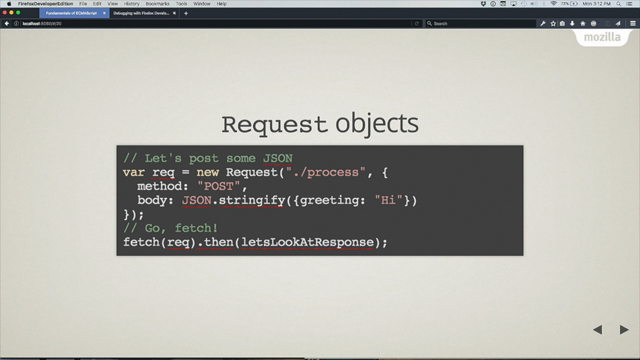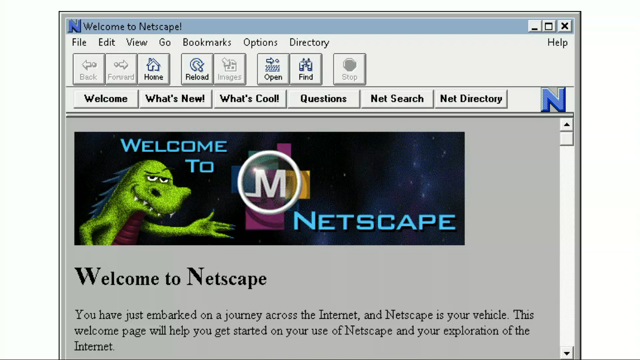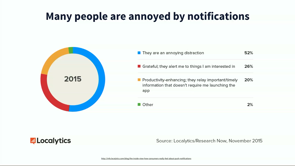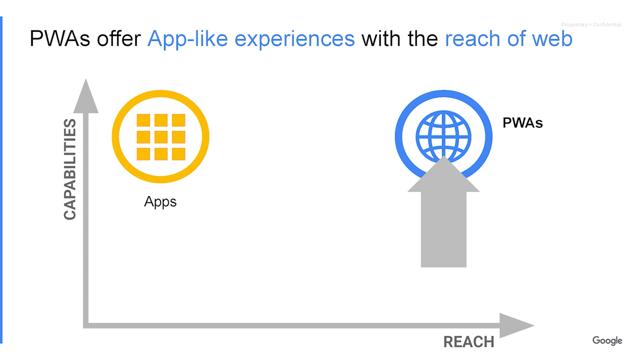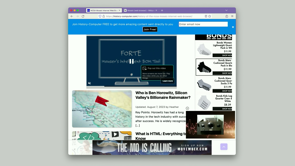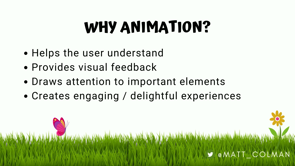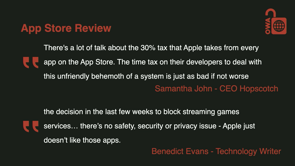
Introduction to Open Web Advocacy and Its Aims
Alex introduces himself and Open Web Advocacy, highlighting their aims for browser competition and feature parity between web and native apps. He details their efforts in advising governments and their global outreach.
The Cost of Anti-Competitive Behavior
Discussion on how anti-competitive practices in app stores harm consumers and developers financially and stifle innovation, leading to fewer apps and greater development costs.
Envisioning a Better Future
Alex outlines desirable features for the future of web apps: security, fast and friction-free interaction, interoperability, and freedom from excessive fees imposed by native app stores.
Challenges Posed by Mobile Operating System Gatekeepers
The speaker details how mobile OS gatekeepers limit consumer choices, enforce unnecessary fees, and impede the web’s full potential by restricting interoperable, fast, and open web app development.
Advantages of Web Apps Over Native Apps
Explains the inherent advantages of web apps, such as being fast, frictionless, secure, interoperable, and free from the rent-seeking behavior of mobile OS gatekeepers.
The Reality of App Store Security
A critical look at the purported security benefits of app store review processes, using industry insights to challenge the effectiveness and integrity of such systems.
Write Once, Deploy Everywhere
Highlights the economic and quality assurance benefits of web apps' ability to run across various platforms without needing separate versions, contrasting this with the costly development cycles for native apps.
The Importance of Openness and Fair Competition
Argues for the necessity of open platforms and fair competition in the app market, pointing out the detrimental effects of the current closed and controlled ecosystem enforced by mobile OS giants.
Historical Perspective on Browser Competition
Provides a brief history of how browser competition evolved on desktop platforms, leading to innovation and better experiences for users, distinguishing this from the monopolistic practices on mobile.
Steve Jobs' Original Vision for Apps on iPhone
Alex revisits Steve Jobs' original announcement about app development for iPhone, emphasizing Jobs' vision for a web-based app ecosystem that aligns with Open Web Advocacy’s current objectives.
Introduction to Web Apps on iPhone
Detailed the integration of web apps with iPhone services, emphasizing ease of distribution, updates, and security without the need for an SDK. Highlighted the initial appeal presented by Apple for web-based app development.
Shift in Apple's Business Model
Explained Apple's pivotal decision to control app installations and demand a 30 percent revenue share from third-party software, contrasting it with their approach on Mac OS and indicating a preference for a closed ecosystem.
Restrictions on Third-Party Browsers
Outlined Apple's strategic move to limit third-party browser capabilities on iOS through App Store guidelines, forcing them to rely on Safari's WebKit, which essentially monopolizes the browser market on iOS and limits web app development.
Consequences of Browser Monopoly
Discussed the negative impact of having no browser competition on iOS, including security vulnerabilities and a stifling effect on web app functionality, which weakens the viability of web apps in competing with native apps.
Challenges in Web App Distribution on iOS
Highlighted the difficulties in installing web apps on iOS compared to the straightforward process for native apps, pointing out that these obstacles significantly hinder the visibility and viability of web apps on the platform.
Regulatory Response and Future Prospects
Shared information on regulatory interventions aimed at preventing Apple from banning third-party browsers and forcing compliance with new laws, notably the EU's Digital Markets Act, setting the stage for a potential legal battle with Apple.
Call to Action for Developers and Regulatory Support
Encouraged developers to report anti-competitive behavior and participate in advocacy efforts to promote fair competition and improve the ecosystem for web apps, emphasizing the potential for change through collective action.
Closing Remarks: The Potential of Web Apps
Concluded with an optimistic vision for the future of web apps, urging continued collaboration between developers and regulators to contest restrictive practices by gatekeepers and realize a competitive, open web environment.
G'day everyone, and thanks to Web Directions for the invitation to be here.
My name's Alex, and I run Open Web Advocacy.
So today, I'm going to talk to you about how powerful, anti competitive forces have prevented the web from reaching its full potential as the world's only truly interoperable solution to app development.
But how the web can still win on mobile and I just need the bopper.
Ah, there we go.
One sec.
Okay, so who are we?
OpenWeb Advocacy is an Australian non profit which has two aims.
The first is fair and effective browser competition on all operating systems.
And the second is feature parity between Native apps and web apps.
In short, we're here to ensure that browsers deliver for developers and consumers, and to make sure that web apps become a success.
We go about this by providing detailed technical advice to governments and regulators all over the world.
And essentially we write lots of responses to various market studies and investigations and go to meetings and answer many hundreds of technical questions.
This is us in the UK.
This is the EU where we, presented the Digital Markets Act and we, met with their enforcement team.
And just this Tuesday at the ACCC, we've also worked with the Japan's headquarters for digital market competition and the United States's, National Telecommunications and Information Administration.
And we're hoping to to reach out to many more over the coming year.
And we don't do this alone.
There's a big thanks to the huge support we've received from developers answering super niche technical questions, helping us build our website and doing our graphic design.
And we couldn't do this without you.
Why is this important?
Simply put, anti competitive behavior hampering both browser competition and web app competition has and continues to cost consumers billions of dollars per year.
And this is not an exaggeration.
Were the web able to fairly and effectively compete with the native app stores, they wouldn't be able to demand a 30 percent cut of all third party software.
These gatekeepers get this cut, not via merit, but by simply blocking all alternative means of running third party software, such as web apps.
And the harm isn't just in the form of these taxes extracted by lock in.
It harms this ecosystem in four other key ways.
More expensive development, the ability to block competitors, or even entire categories of apps, greater cost of friction of getting to market, leading to apps simply not existing in the first place, and it ensures that new mobile device ecosystems are completely deprived of a library of apps.
And unfortunately, a lot of this harm is very hard for the average consumer to see.
Consumers can't see price increases due to high development costs or the app that never got built because it was made economically unviable by the wealthiest companies in the world, just so that they can enrich themselves at the customer's expense.
Now, I think it's important to Imagine the kind of future that we do want and, predicting the future is hard, but I think if we could choose some of the properties of that future, we, we, would want would be first secure and computers are taking an increasingly important role in our lives and that the damage that can be done for a security flaw is quite significant.
And we need our apps and online interactions to be secure by design.
Second, fast and frictionless.
We want our users to be able to try our apps quickly and being able to safely try at the tap of the link within seconds, not minutes.
Third, we want them to be interoperable.
In order for competition to thrive we need to be able to switch between different devices made by different manufacturers with different operating systems.
And of course, there's always going to be some level of friction between ecosystems, but the smaller we can make it the less lock in there's going to be.
And the more stuff that will just work.
And the last is, or the fourth one is write once.
Writing applications in multiple languages is both hard and expensive.
Worse, you have to maintain them, and then you have to keep all the different versions in sync.
And this is a massive drain on development resources that could just simply be spent on making the app better.
And the dream is to write the app once.
And then have it work everywhere on all operating systems.
And this not only significantly reduces the cost, it vastly improves quality.
And finally, open and rent free.
And that is consumers, not the companies that build operating systems, should be able to choose the apps that they want to use.
Operating system gatekeepers shouldn't be able to extract rent by simply blocking consumers from installing apps from third parties.
And they shouldn't be able to block, or ban entire categories of apps that compete with their own products.
So how does the current reality on mobile stack up with this vision?
And the answer is, not great.
Mobile operating system gatekeepers have seized control from consumers over their own devices.
They set the rules, they decide which apps are allowed and which aren't, and they can ban entire apps or categories of apps that compete with their own.
Now, the ability to unilaterally decide what apps the consumer is allowed to install is an incredibly powerful tool at the hands of unscrupulous gatekeepers.
And this is nominally done in the name of security.
Despite the security being relatively ineffective compared with the sandboxing and security of the web.
And it's well known in the industry just how difficult it is to deal with apps or review.
And to quote Samantha John, the CEO of Hopscotch, which is an award winning iOS app.
There's a lot of talk about the 30 percent tax that Apple takes from every app on the App Store.
The time tax on their developers to deal with this unfriendly behemoth of the system is just as bad, if not worse.
And in some cases, they just ban entire categories of apps that compete with their own.
Benedict Evans writes, the decision in the last few weeks to block streaming gaming services– there's no safety, security, or privacy issue, Apple just doesn't like those apps.
Some gatekeepers have chosen to make their devices non interoperable by design.
And that might sound paranoid, but in private emails discussing opening up iMessage and making it interoperable, Apple executives said, iMessage amounts to serious lock in and iMessage on Android would simply serve to remove an obstacle for iPhone families giving their kids Android phones.
Unfortunately, gatekeepers are primarily concerned about profit.
Locking out the web from competing with their app stores is a positive, not a negative.
Matthew Ball writes, Instead, Apple is inhibiting this future internet, and it does so via tolls, controls, and technologies that not only deny what made and still makes the open web so powerful, but also prevents competition to prioritize Apple's own profits.
So how could the web be better than this?
Every year, browsers become more powerful, less buggy, more secure, and they add the functionality web apps need to compete against the mobile app stores.
There has never been a better time to make web apps.
The web is fast and frictionless, it's secure, it's interoperable, which means write once, and it's open and rent free.
Amazing apps are being built every single year using the power of the web, and the boundaries of what you can do It's getting pushed further and the gap between what native apps can do and what the web apps can do is getting narrower and narrower.
And this is on top of the massive innate advantages that the web has.
So it's no surprise that major companies are investing in this space.
Today, 90 percent of the apps on your phone can be written as a web app.
And would be indistinguishable, significantly cheaper, and often better than native apps.
First, the web is fast and frictionless.
A user can receive a link from a friend and have a web app installed and be using it within seconds.
The UI can load near instantly after a few hundred kilobytes, compared with the several hundred megabytes that's typical for a native app.
And the ability to quickly and securely try an app together is an enormous advantage for customer acquisition.
Second, security.
Security is a big one because it's the primary argument that gatekeepers use to try and block competition.
Browsers have incredible security because they have to.
Websites can run any code they want, checked by no one.
Because of this, browsers have adopted a paranoid, trust no one approach to security, and incredible care has been taken to make sure one tab can't access another, and that websites are tightly sandboxed and dangerous functionality is tightly controlled by the browser.
This approach works.
And even Apple agrees that the web is superior to the security of native apps.
To quote Apple, WebKit's sandbox profile on iOS is orders of magnitude more stringent than the sandbox for native iOS apps.
But what about?
Natives got app review, don't they?
Apple's placed great trust in app review.
Despite the fact they have a mere 500 reviewers.
These reviewers have to review 100, 000 plus apps per week and they aren't even reading the code.
It's already compiled and it's unreadable by the time of review.
Each reviewer gets 15 minutes to manually click around the UI which is unlikely to pick up many types of malicious apps.
Apple's head of fraud, when discussing AppReview said, Regarding review processes, please don't ever believe that they accomplish anything that would deter a sophisticated hacker.
I consider them a wetware rate limiting service and nothing more.
And so this suggests that while Apple outwardly projects there's a huge amount of confidence in their app store, some internally view it as worthless.
One of my favorite quotes, is, the most dangerous feature that browsers have are not the device APIs, it's the ability to link to and download native apps.
Even anecdotally, we know this is true.
For example, the most thing you can do on dangerous, thing you can do on Windows is to trick the user to download and run an EXE.
And malicious websites these days will mostly try to get you to download a scam app from the mobile app stores.
Number three, so that was security.
Number three is interoperable and write once.
Browsers provide a platform layer that's interoperable between operating systems.
Differences in system APIs are handled by the browser, not the developer.
Write once works everywhere.
And the cost savings in development and maintenance are massive.
So compared with having to develop an app multiple times, you could potentially save up to a fourth of the cost of having to develop each app in their individual ecosystem.
And it's not just cost, it's quality as the team can focus more on bugs and focusing on what makes their app great.
And the last one is open and rent free.
In the same way operating systems don't dictate what websites you're allowed to visit.
Operating systems shouldn't be allowed to dictate what apps we can install, particularly if those apps compete with their own services.
Operating systems on expensive devices sold at high margins shouldn't be allowed to block the web from competing on a platform just so they can extract a 30 percent cut.
We don't put up with it on desktop.
We shouldn't on mobile.
And despite all of these advantages on the web, the web, isn't allowed to effectively compete on mobile.
Why is that and how did we get here?
Back in the day when IE6 first came out, it was a really decent browser, but then development stagnated.
And luckily, it hadn't occurred to Microsoft to just outright ban all the rival browsers.
So it had competition.
First, Mozilla resurrected Netscape and came out with Firefox.
Then Apple forked Konqueror's Browser Engine and Safari's was born, then later Google joined the party and they soft forked Safari's WebKit, which they eventually forked to make Blink, which is now used to power Chrome and Edge.
These third parties and other smaller browsers were able to compete and innovate to push the web forwards because consumers could actually install these browsers, and these browsers had all the access they needed to the underlying operating system and hardware.
Users flocked to these new browsers and droves, and fantastic new functionality and performance was unlocked for developers.
And Internet Explorers market share plummeted from 95 percent down to the 1 percent it is today.
And this was only possible because competition was allowed.
If Microsoft had decided, or been able to, block all third party browsers on Windows, even if other operating systems have browsers, the web might look very different today.
What happened on mobile?
Initially, browsers only had limited functionality on phones, but this changed with the introduction of high powered smartphones, and in particular, the iPhone.
Steve Jobs original vision of the web on mobile devices is the same vision we have today.
We're going to jump back to all the way back to 2007, when Steve first announced how all apps would work on Apple's new device.
[SteveJobs] What about developers?
What about developers?
We have been trying to come up with a solution to expand the capabilities of iPhone by letting developers write great apps for it and yet keep the iPhone reliable and secure.
And we've come up with a very sweet solution.
Let me tell you about it.
We've got an innovative new way to create applications for mobile devices.
Really innovative.
And it's all based on the fact that iPhone has the full Safari inside it.
The full Safari engine is inside of iPhone.
And it gives us tremendous capability, more than it's ever been in a mobile device to this date.
And you can write amazing Web 2.
0 and Ajax apps that look exactly and behave exactly like apps on the iPhone.
And these apps can integrate perfectly with iPhone services.
They can make a call.
They can send an email.
They can look up a location on Google Maps.
After you write them, you have instant distribution.
You don't have to worry about distribution.
Just put them on your internet server.
And they're really easy to update.
Just change the code on your own server.
Rather than having to go through this really complex update process.
And they're secure, with the same kind of security you'd use for transactions with Amazon or a bank.
And they run securely on the iPhone, so they don't compromise its reliability or security.
And guess what?
There's no SDK that you need.
You've got everything you need if you know how to write apps using the most modern web standards to write amazing apps for the iPhone today.
You can go live on June 29th.
Unfortunately for everyone, Apple ultimately decided on a different model.
One where they kept exclusive control of app installation and then utilized that control to demand a 30 percent cut of all third party software on devices they had already sold at incredibly high profit margins.
Something they never able to achieve on Mac OS.
This is a quote from Philip Schiller discussing the Mac OS App Store.
Neither is on the store because they don't have to be.
They can be on the Mac and distribute to users without having to share the revenue with us.
Now, I think this gives some indication of as to why Apple decided that this business model was preferable to their initial open web based model that Jobs had announced at that conference.
Next, Apple did what Microsoft hadn't.
They effectively banned all third party browsers from iOS.
And they did this by rule 2.
5.
6 of the App Store guidelines.
Apps that browse the web must use the appropriate WebKit framework and WebKit JavaScript.
This very innocuous rule, in fact, forces the entire content area of the browser and the majority of the functionality important to web apps to be exclusively controlled by Apple.
This essentially makes all browsers on iOS reskinned version Safari.
And what Apple's really saying with this clause to third party browser vendors is throw away the browser that you've spent a hundred thousand plus hours working on and build a thin user interface shell around Safari of which we have total control over and that you can't modify.
This in turn sets a ceiling to the functionality of all web apps, not just on iOS, but on Android as well, because no developer is going to implement functionality that over half their customers cannot use.
This has deprived web developers of the fundamental tools and stability they need to compete with native apps.
This is important because it means there is effectively no browser competition on iOS.
If Apple decides they're not going to support a web API in Safari, it means iOS will never have that API.
And then for the majority of developers, that API might as well not exist.
This also makes security weaker on iOS.
Every time there is a major vulnerability in WebKit, it affects Every single browser on iOS.
Just today, a severe vulnerability discovered by security researchers affecting WebKit called iLeakage was announced.
And it allows hackers to steal your passwords just by visiting a web page.
And one user on Slashdot com commented, just switch to a browser using a different rendering engine on iOS until it's patched.
Oh.
Lack of browser competition on a major platform is also important as it's competition that provides web apps with the functionality they need to compete with native apps.
Our aim is feature parity between web apps and native apps.
If a browser faces no competition, they feel no pressure to implement or make stable key pieces of functionality.
No user's going to go buy a new phone or, because of a missing or buggy web API, they're just going to blame your web app or they're going to conclude that the web is just buggy and unviable.
As we saw with Internet Explorer, browsers that face real competition need to get better fast or they will lose market share.
When we first started our campaign, we compiled a list of the most important functionality missing from web apps.
And in response to that campaign, Apple's implemented two of the most critical features for web apps, namely push notifications and badging.
And in addition, they've hired an additional 60 plus staff based on their job postings.
But for web apps to truly thrive, we need your help to push for the remaining critical features.
And I want to go for the most important one, which is install prompts.
So if we look at Android, installing install prompts on Android's breeze, just get this lovely install button, tap.
And the web app installs, so very simple, very straightforward.
If we go onto iOS and look at native apps, you, developers can build these beautiful custom buttons, customized for each of their app, which when you tap on them triggers the, the app install process by going to the, app store.
So it's, very easy for native apps, app developers to acquire, to acquire users.
Now, if we look at installing web apps on iOS.
You have to tap the share button and then you get this screen and then you have to scroll up then you have to find add to home screen and then click add.
So it's completely, obscured compared to what you get for native apps.
Mozilla stated most iOS users don't even know web apps exist, and if the majority of users don't know how to install web apps on a platform as major as iOS, they will never be viable, doubly so since install is a prerequisite for push notifications.
As Apple has banned all browsers from iOS, no other browser can implement it.
And, in iOS, they make installing web apps visible, frictionless, and easy, but they refuse to do the same for web apps.
So next up, regulators in the USA, Australia, UK, and Japan have all recommended that Apple no longer be allowed to ban third party browsers.
And the EU has gone as far to enshrine it into law in their landmark Digital Markets Act.
And this is something we're going to continue to work with these regulators and reach out to any other regulators that are starting to do market investigations into this topic.
The next major event is in March next year.
At which time, all of the gatekeepers must be in compliance with the EU's Digital Markets Act.
Now, we haven't heard anything from Apple, at all, about their plan to allow third party browsers.
Our expectation is there's going to be a bitter fight where Apple's going to see how far they can push to not complying with the DMA, as they can go.
Apple reportedly has a budget of over 1 billion, a legal budget of over a billion dollars a year and adopts an exceptionally aggressive stance.
And if you want to understand Apple's approach to legal, Bruce Sewell, who's Apple's former general counsel, discusses it with law students, where he says, Work out how to get closer to a particular risk, but be prepared to manage it if it goes nuclear.
Steer the ship as close as you can to that line, because that's where the competitive advantage occurs.
Apple had to pay a large fine.
Tim Cook's reaction was, That's the right choice.
Don't let that scare you.
I don't want you to stop pushing the envelope.
Now, the DMA can fine these companies 10 percent of their global revenue, so I'm, I guess we're about to find out if that's scary enough, but this sort of malicious compliance is why regulators need the continued support of developers to explain why this is important, why it matters, and to arm them with the technical knowledge to fight back.
How can you help?
First, write to us about anti competitive behaviour related to browsers or web apps.
We're in regular communication with multiple regulators about anti competitive behavior from a range of companies, not just Apple.
And this information is vital for us.
So we know where to focus our efforts.
Second, tell us what you're missing from web apps to make it your company's primary distribution method.
And third, at the end of the slides, scan the QR code, join our mailing list, and we'll give you updates about what we're doing and if there's any opportunities to, to contribute So, our message is this.
If we work together, we can solve these issues.
Around the world, regulators are waking up to the profound damage these gatekeepers are inflicting on the web.
We can have a world where these companies can compete fairly and effectively via the web to reach consumers on each operating system without being subject to the whims of gatekeepers who only care about their own profit.
And locking in consumers into their ecosystems.
The web can still win on mobile, and with your help, it will.
Thank you very much.
